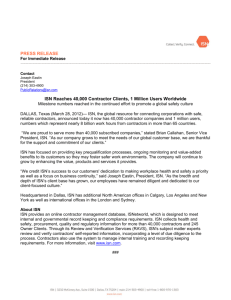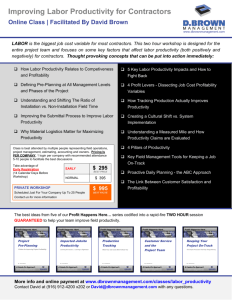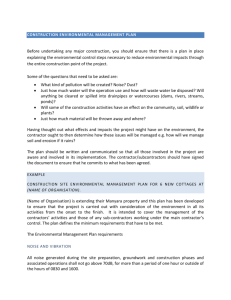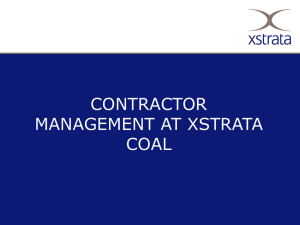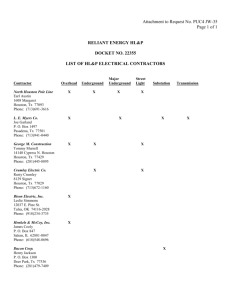Drainage Undertaking - Northern Midlands Council
advertisement
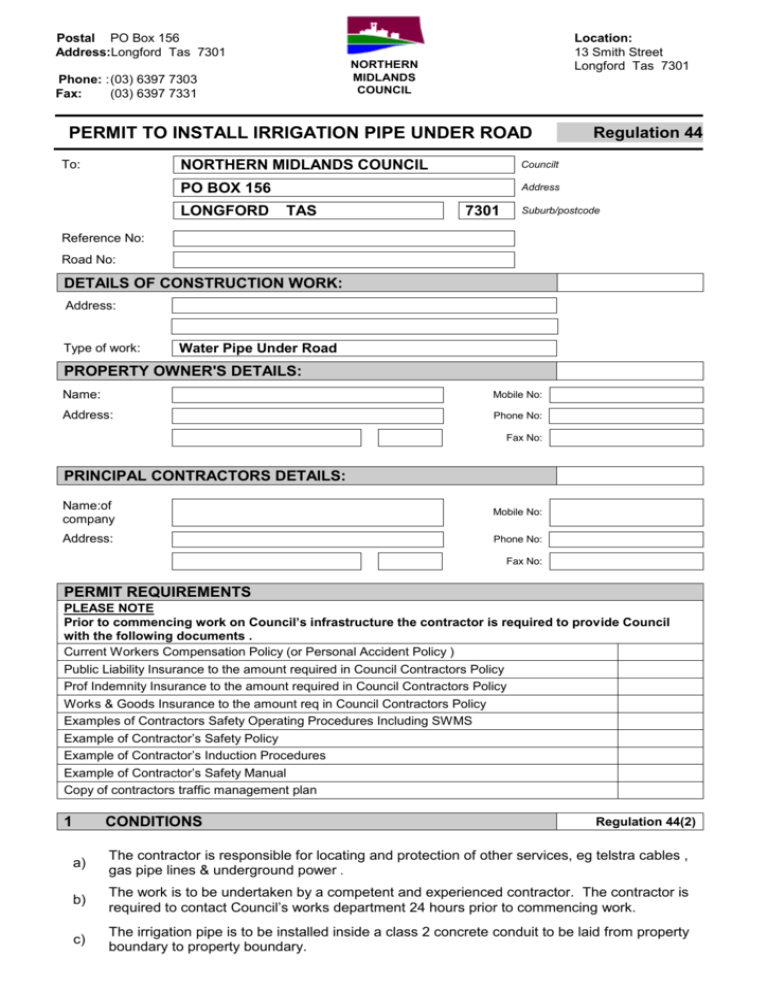
Postal PO Box 156 Address:Longford Tas 7301 Location: 13 Smith Street Longford Tas 7301 NORTHERN MIDLANDS COUNCIL Phone: : (03) 6397 7303 Fax: (03) 6397 7331 PERMIT TO INSTALL IRRIGATION PIPE UNDER ROAD To: NORTHERN MIDLANDS COUNCIL Councilt PO BOX 156 Address LONGFORD TAS 7301 Regulation 44 Suburb/postcode Reference No: Road No: DETAILS OF CONSTRUCTION WORK: Address: Type of work: Water Pipe Under Road PROPERTY OWNER'S DETAILS: Name: Mobile No: Address: Phone No: Fax No: PRINCIPAL CONTRACTORS DETAILS: Name:of company Mobile No: Address: Phone No: Fax No: PERMIT REQUIREMENTS PLEASE NOTE Prior to commencing work on Council’s infrastructure the contractor is required to provide Council with the following documents . Current Workers Compensation Policy (or Personal Accident Policy ) Public Liability Insurance to the amount required in Council Contractors Policy Prof Indemnity Insurance to the amount required in Council Contractors Policy Works & Goods Insurance to the amount req in Council Contractors Policy Examples of Contractors Safety Operating Procedures Including SWMS Example of Contractor’s Safety Policy Example of Contractor’s Induction Procedures Example of Contractor’s Safety Manual Copy of contractors traffic management plan 1 CONDITIONS Regulation 44(2) a) The contractor is responsible for locating and protection of other services, eg telstra cables , gas pipe lines & underground power . b) The work is to be undertaken by a competent and experienced contractor. The contractor is required to contact Council’s works department 24 hours prior to commencing work. c) The irrigation pipe is to be installed inside a class 2 concrete conduit to be laid from property boundary to property boundary. d) The pipes are to be installed on 100mm of crusher dust bedding sand. e) The trench shall be excavated to the width specified on the attached drawing to allow for proper compaction of backfill material next to the pipe. f) The pipes are to be backfilled with crusher dust to within 300mm of the road surface and completed to the road surface with 300mm of quality assured gravel which has sufficient water content to ensure compaction. g) All back filling to be compacted with a vibrating trench rammer. h) The contractor to be responsible for continued traffic flow and safe traffic management (including signage) while undertaking the work. i) The property owner agrees to pay for the resealing of the road. This is generally in excess of $250 subject to whether Council is working in the area at the time and the distance from the Works Depot. j) The contractor is responsible for any costs in association with the subsidence of the trench for a period of twelve (12) months. 2 - SAFETY 2.2 Occupational Health & Safety Contractors are to make themselves familiar with and all work is to be carried out in accordance with the Northern Midlands Council’s Occupational Health & Safety Policy for Contactors as attached. The contractor shall carry out the whole of the works in a thoroughly safe manner and in particular conform to the requirements of all relevant Act and Statutes of Parliament, Regulations, By Laws or Orders relating to the safety of persons on or about the site 2.3 Safe Work Method Statements (SWMS) The contractor is required to provide council with an appropriate SWMS (Safe Work Method Statement) that includes all identified and known risks, hazards and controls prior to the commencement of work. 2.4 Plant and Equipment The contractor shall ensure that all plant and equipment necessary for the execution of the works is of adequate strength and safe for use and shall remove for the site any equipment that becomes or is likely to become unsafe. 2.5 Traffic & Pedestrian Safety & Management The Contractor and its employees shall be required to comply with the Northern Midland Council's safety policies as the minimum standard at all times and shall be required to display all the necessary advisory signs indicated by the Australian Standards 1742-3 2012 Traffic Control Devices on Roads. Works on site shall recognise the need to ensure the safety of all traffic and pedestrians and shall install all necessary signs and barriers. If the road authority requires a traffic management plan, work shall not commence until it is approved by that authority. The traffic management plan is to be provided by a person competent to provide such a plan and the approved plan is required to be adhered to. All persons installing signs are required to have a current signage Traffic Control Ticket. Alpha Tas is a local company which has suitably qualified persons to undertake this type of work. There are also a number of other companies listed in the yellow pages that also undertake traffic control. 2.6 Barriers The site shall be maintained to meet statutory occupational health and safety requirements and work within the stated work site to provide protection to the approval of all Codes of practices and Departments. The contractor shall provide, erect and maintain all necessary warning signs, temporary barriers, security fences, footways, cart ways etc for the protection of the public and workers. 3 - INSURANCE Certificates of Currency for insurance will be required to be presented to Council for inspection prior to providing the permit and or work commences. The following policies must be maintained until the contractors liabilities and obligations cease, which is twelve months after the completion of the work. a) Public Liability Indemnity Insurance Policy to the value of not less than $10 million. b) Workers Compensation Insurance Policy for themselves and all employees including liability by statue at common law to comply with the Tasmanian Workers Compensation Act in force in Tasmania and the Common Law Section of the policy shall be increased to an unlimited amount c) Appropriate insurance in regards to vehicles and equipment.ie Motor Vehicle Third Party Property Damage Policy d) It is the contractor’s responsibility to verify that his contracts with sub contractors and suppliers contain adequate terms and conditions relating to insurance .nothing in this clause shall prevent the contractor from insuring against all and any risks he may foresee. NORTHERN MIDLANDS COUNCIL CONTRACTOR’S AGREEMENT (Name of Contractor) ...................................................................................................................... Under the Workplace Health & Safety Act 2012, Workers Rehabilitation & Compensation Act 1988 and Environment Protection Act 1997 Northern Midlands Council can be responsible for the actions of contractors performing work on its premises. This agreement requires you to meet all legal and financial requirements of these Acts including, but not limited to, the following: 1. You must report to the designated Northern Midlands Council Engineering Officer on 0400 935 642 prior to commencement, and on completion of the work. 2. You must only carry out work for which you are licensed. You must make available competency certificates or relevant licences for inspection by the designated Northern Midlands Council supervisor before commencing work. 3. You must undertake a formal SWMS (Safe Work Method Statement) which must be understood and signed by all your employees before commencing each project. 4. You must exercise care to ensure that any danger to Northern Midlands Council employees and visitors as a result of the work is minimised through the use of appropriate screens and barricades or modified work practices to the satisfaction of the designated Northern Midlands Council supervisor. 5. You must not, without the prior approval of the designated Northern Midlands Council supervisor, bring onto Northern Midlands Council premises any dangerous goods. (Approval will only be given on the understanding that all dangerous goods will be transported, handled and stored in accordance with the Dangerous Goods Act 1975, the Australian Dangerous Goods Code and the relevant Australian Standards.) 6. You must not, without prior approval from the designated Northern Midlands Council supervisor, undertake any work involving noxious fumes, dust, excessive noise or water– borne pollutants. 7. You must not allow trade waste to enter stormwater drains or sewerage lines. 8. You must report immediately to the designated Northern Midlands Council supervisor any accident, hazard, near miss, leak, spill or fire. Sighted Documents: Prior to commencing work - Current Workers Compensation Policy (or Personal Accident Policy ) YES - Public Liability Insurance to the amount required in Council Contractors Policy YES - Prof Indemnity Insurance to the amount required in Council Contractors Policy YES NO - Works & Goods Insurance to the amount req in Council Contractors Policy YES NO - Examples of Contractors Safety Operating Procedures Including SWMS YES NO - Example of Contractor’s Safety Policy YES NO - Example of Contractor’s Induction Procedures YES NO - Example of Contractor’s Safety Manual YES NO I have received appropriate instructions and received a copy of Council’s OH&S Requirements for Contractors Signature of Contractor: Company Name: ..................................................... Date: .............................. ..................................................................................................................... I confirm that I have sighted the documentation specified above. Supervisor’s Signature: Date: PRIVACY STATEMENT The Northern Midlands Council abides by the Personal Information Protection Act 2004 and views the protection of your privacy as an integral part of its commitment towards complete accountability and integrity in all its activities and programs. Collection of Personal Information: The personal information being collected from you for the purposes of the Personal Information Protection Act, 2004 and will be used solely by Council in accordance with its Privacy Policy. Council is collecting this information from you in order to process your building application. Disclosure of Personal Information: Council will take all necessary measures to prevent unauthorised access to or disclosure of your personal information. External organisations to whom this personal information will be disclosed as required under the Building Act 2000. This information will not be disclosed to any other external agencies unless required or authorised by law. Correction of Personal Information: If you wish to alter any personal information you have supplied to Council please telephone the Northern Midlands Council on (03)6397 7303. Please contact the Council’s Privacy Officer on (03)6397 7303 if you have any other enquires concerning Council’s privacy procedures. Policy 12 OCCUPATIONAL HEALTH & SAFETY (Incorporating Policy No’s 13 & 39 - Min Ref: 298/10 – 15/11/2010) POLICY NUMBER 12 OBJECTIVE To ensure that a safe and healthy work environment is created for all its employees and contractors and compliance with applicable legislation STATUTORY AUTHORITY Workplace Health & Safety Act 1995 and accompanying Regulations Workers Rehabilitation & Compensation Act 1988 POLICY Adopted 4 August 1997-Minute No 304/97 (Policy No. 13 OH&S for Contractors - Adopted 19 October 1998 (Min Ref 442/98)) (Policy No. 39 – Sun Protection Policy - Adopted 31 May 2004 - Minute No 176/04) Amended 15 November 2010 – Minute No. 298/10 Policy – combining Policy No. 12 OH&S; Policy No. 13 OH&S for Contractors; and Policy No. 39 – Sun Protection Policy Amended 19 March 2012 – Minute No. 72/12 Policy incorporating Management Policy – Alcohol and Drugs POLICY 1. POLICY STATEMENT Northern Midlands Council (Council) is committed to the occupational health, safety and welfare of its employees, those contracted to perform work for the Council and the public at large. Council regards its’ occupational health and safety responsibilities with the utmost importance. 2. OBJECTIVES To achieve a safe and healthy work environment Council commits to: Complying with all relevant Acts, Regulations, Standards and Codes of Practice; The promotion and maintenance of safe working conditions; Instigating, implementing and monitoring correct work practices; Establishing and sustaining a framework of continuously improving standards of workplace health and safety; Providing information, instruction, training and supervision to employees, contractors and customers to ensure their safety; and Providing rehabilitation to employees injured at work. The safety practices of contractors are also important and Council’s minimum safety requirements for contractors are also set out in this policy This policy is applicable to all Council operations and functions including those situations where employees are required to work off site. 3. STRATEGIES Develop safe working practices to ensure hazards to Council employees and contractors are minimised with training and regular inspection of work premises. Promote a proactive approach to health and safety with newsletters/signage. Audit and improve occupational health and safety standards. Ensure that contractors and third parties clearly understand and comply to Council's Occupational Health and Safety Policy by: o Contract specification: ensuring that appropriate health and safety requirements are incorporated into specification documents. o Tender evaluation: establishing a systematic approach to evaluating tenderer's health and safety capabilities and resources. 4. OCCUPATIONAL HEALTH AND SAFETY LEGISLATION Council commits to compliance with the provisions of Occupational Health and Safety legislation including but not limited to: Workplace Health & Safety Act 1995 and Regulations; and Workers Rehabilitation & Compensation Act 1988 5. LEGAL OBLIGATIONS 5.1 Employer The Workplace Health & Safety Act 1995 (Act) states that the Chief Executive shall: “…ensure so far as is practicable that the duties and obligations imposed on any person by or under this Act are complied with” Under the Act, “an employer must, in respect of each employee employed by the employer, ensure so far as is reasonably practicable that the employee is, while at work, safe from injury and risks to health and, in particular, must:– a) provide and maintain so far as is reasonably practicable; (i) a safe working environment; (ii) safe systems of work; and (iii) plant and substances in a safe condition; b) provide facilities of a prescribed kind for the welfare of employees at any workplace that is under the control or management of the employer; c) provide any information, instruction, training and supervision reasonably necessary to ensure that each employee is safe from injury and risks to health.” The employer must also notify the Workplace Standards if a person is killed or suffers serious bodily injury or illness through an accident at work. 5.2 Employees Under the Act, “while at work, an employee must:– a) take reasonable care for the employee’s own health and safety and for the health and safety of other persons, including persons working under the direction or supervision of the employee, who may be affected by the employee’s acts or omissions at the workplace; and b) comply with any direction given to the employee by an employer or responsible officer with respect to any matter in relation to health and safety under this Act.” 6. RESPONSIBILITY 6.1 Managers Each Business Unit Manager is accountable for implementing this policy in their area of responsibility. Management is responsible for: The provision and maintenance of the workplace in a safe condition; Involvement in the development, promotion and implementation of health and safety policies and procedures; Ensuring employees are trained in the safe performance of their assigned tasks; Identifying, controlling and where possible eliminating hazards from the workplace; Investigating accidents and implementing remedial action; and The provision of resources to meet health and safety commitments. 6.2 Employees Each employee is responsible for: Taking reasonable care of their own health and safety and that of others in the workplace; Complying with health and safety policies and procedures; and Reporting all known hazards to their supervisor. Compliance with legislative requirements in regards to occupational health and safety is the minimum standard acceptable to Council and it is recognised that a team effort is required to achieve this objective. Anyone found in breach of health and safety requirements may be subject to an official warning or dismissal. To support this policy occupational health and safety systems shall be developed, reviewed and upgraded where necessary. Council is committed to consultation and cooperation between management and employees and will involve the Risk Management and Employee Safety Committee in any workplace change that will affect health and safety of any of its employees. Contract management - ensuring that contractor health and safety performance is adequately monitored and supervised for the duration of the contract. 7. SUN PROTECTION All Council employees and contractors who work outdoors or who are outdoors as a result of work requirements for any part of the day are required to wear the following items of clothing: Long trousers, long legged shorts which must not be rolled up (except that long trousers are to be worn when directed by Council’s Works Manager or Council’s Works Supervisors) Long sleeved shirts with a collar Broad rimmed hats Safety glasses complying with AS1067, AS1337 30+ Broad Spectrum Sunscreen on all exposed skin surfaces to be renewed at regular frequencies in accordance with usage instructions to be applied at the commencement of each working day and at the end of each meal break or other break Skirts to the knees Socks to be worn at all times and kept up In relation to non-compliance of Council’s Sun Protection guidelines by employees, the disciplinary action may be taken. Managers and Supervisors are responsible for the management, monitoring, and enforcement of this policy. 8. ALCOHOL AND DRUGS Council provides a work environment which aims to ensure the health, safety, respect and productivity of all employees. The use of drugs and alcohol may impair an individual’s capacity to perform their job safely, efficiently and with respect for work colleagues and customers. The use of such substances may result in the risk of injury or a threat to the wellbeing of the impaired employee, other employees or members of the general public. Under no circumstances is an employee to commence work, or return to work while under the influence of drugs or alcohol. Council vehicles, plant and equipment are not to be driven or operated by any person who is under the influence of illicit or non-prescription drugs or alcohol. In addition, council vehicles, plant and equipment are not to be driven or operated by any person who is under the influence of prescription medication that may impair judgement to such an extent that the employee places himself or herself, or any other person at risk. Council will not accept any liability for any damage to a Council vehicle, injury to another person, or damage or injury to any third party incurred while the driver of a Council vehicle or an operator of Council plant and equipment is under the influence of drugs or alcohol. All liabilities rest with the driver/operator concerned. Any employee who breaches this policy will be subject to Council’s disciplinary procedures. 8.1 Prescription Drugs If you take prescription drugs please check with your doctor to establish if the use of the drug will impact on work performance. If so, please obtain this advice in writing and provide this advice to your manager. 8.2 Smoking Northern Midlands Council observes a no smoking policy in all premises, including Council vehicles. 8.3 Drug And Alcohol Testing To ensure the maintenance of this policy all employees may be subject to drug and alcohol testing. Drug testing may be required where, by way of observation or other reasonable method, including disclosure, an employee’s behaviour or work performance indicates the person is under the influence of drugs or alcohol. The introduction of the Drug and Alcohol Testing Programme is about altering behaviour and raising drug and alcohol awareness to create a safer work environment. The programme is not intended to create, nor operate to create a work environment which is harsh, unjust or unfair. However, due to the importance of ensuring safety in the workplace, employees who breach the drug and alcohol policy may be disciplined. At all times during the implementation of the drug and alcohol testing process, management and staff shall conduct themselves in a courteous manner toward employees and shall respect the employee’s rights. Any member of management who acts without reasonable cause, or who behaves over zealously in the implementation of these procedures shall be subject to disciplinary action. The method of investigation is as follows: an observation must be made, or information given that indicates the employee has behaved in a way which indicates a breach of this policy and/or which may put themselves and other employees at risk of their health and safety. the employee will be asked to explain their behaviour. If no reasonable or satisfactory response is given, the employee may be asked to undergo an examination at the local hospital or medical practitioner to ascertain whether they are under the influence of alcohol or drugs. the employee may also be asked to go home until the end of the day or shift. on the employee’s return to work and following receipt of the results of any tests, the employee will be interviewed by his/her manager. The employee may have a witness/representative present. allegations may be made to the employee and the employee will be asked to respond. Depending on the response further investigation may take place to assist the Council determine the facts and /or appropriate disciplinary action to be taken. an employee who refuses to undergo testing of their health may find it difficult to provide evidence to disprove an allegation they have breached this policy. in the absence of medical evidence to disprove an allegation the Council will make any decision it feels is reasonable and justified, given observation, witness statements and any other sources of evidence which are relevant to the investigation. Employees will not be treated harshly, unfairly or unjustly by this policy. All reasonable efforts will be made to ensure confidentiality re personal information about employees. Northern Midlands Council provides the services of an Employee Assistance Program, including counselling to assist employees in the treatment of alcohol or drug use problems. Details of the program and are provided in the Employee Handbook, if you need to take advantage of the service contact Newport & Wildman on 6332 0999. 9. OCCUPATIONAL HEALTH & SAFETY REQUIREMENTS OF CONTRACTORS This document outlines the minimum occupational health and safety requirements that Contractors need to adhere to when completing works for Council and should be read in conjunction with the Contractor’s Agreement form (Attachment A). 9.1 Accident Reporting Contractors must promptly notify Council’s Infrastructure Manager of any accident, injury or property damage which occurs during the carrying out of contract works. All lost time incidents shall be immediately notified to Council. The Contractor must within three (3) days of any incident provide a report giving complete details of the incident, including results of investigations into its cause, and any recommendations or strategies for prevention in the future. 9.2 Worksite Inspections The Contractor as an employer has a duty of care to provide and maintain a safe workplace and consequently has an important responsibility to conduct workplace inspections on a regular basis. The Contractor needs to make available copies of health and safety inspection reports for review when requested by Council. Council also has a responsibility to monitor health and safety aspects of Contractor operations to ensure as far as is can reasonably establish that the Contractor is adequately fulfilling its health and safety obligations. When inspections are carried out by Council a representative of the Contractor will be involved to enable discussion and resolution of issues as they are identified. 9.3 Protective clothing The Council requires personal protective equipment to be worn by contractors for their own protection. This equipment should be worn whenever required and properly maintained at all times. Head Body safety helmets hard hats sun hats/caps Ears ear muffs ear plugs Eyes long trousers/long legged shorts sun glasses Respiratory system face masks 9.4 overalls long sleeve shirts* reflective safety vests Hands gloves barrier/sun creams Legs chaps face screen safety glasses Feet steel capped boots Safety Footwear Steel capped boots must be worn at all times by outdoor contractors when onsite and anyone else as directed by their supervisor. 9.5 Head Protection It is a requirement that safety helmets/hard hats be worn at all times while there is a danger of being struck from above by falling objects or mechanical equipment e.g. working in a trench, working in the vicinity of a backhoe or other machinery, using a chainsaw, at building construction sites. 9.6 Reflective Vests Reflective vests must be worn at all times while working outdoors. 9.7 Eye Protection The wearing of eye protection is mandatory when performing any of the following tasks or using any of the following machinery or equipment, or any other situation where there is a risk of injury to the eyes: 9.8 all power tools chainsaws lawn mowers/brush cutters compressed air grinders machining wood/timber drilling or chipping earth, metal, timber, stone, brick or concrete handling harmful acid or caustic liquids mixing or spraying chemicals working underneath vehicles shovelling powdery material in windy conditions or any other situation as advised Hearing Protection All contractors must wear hearing protection where noise levels are above 85 decibels as specified in the Australian Noise Standards. Employees must wear earmuffs when using noisy equipment or working in the immediate vicinity of a noisy operation. For example: lawnmower brush cutter chainsaw backhoe or other large machinery pavement cutting machine 9.9 pipe cutting machine vibrating plates or roller Hand Protection Gloves should be worn to protect hands when handling rough, slippery, splintery, hot or sharp objects and impervious gloves must be worn when handling harmful substances, acids, chemicals or solvents. 9.10 Sun Protection Contractors who are required to work outside need to wear accepted safety equipment to reduce the change of excessive sun exposure. This equipment should include: a broad brimmed hat with fitted chin strap a pair of ultra violet reducing safety sunglasses an acceptable 30+ sun screen Contractors are required to wear protective equipment during high risk ultra violet exposure periods. If during the performance of works under a contract the Council informs the contractor that it is the opinion that the contractor is not complying with Sun Protection clothing requirements, Council may direct the contractor to suspend the work until such time as the contractor satisfies Council that the work will be resumed in conformity with applicable health and safety provisions. 9.11 Jewellery, Clothing and Hair Under legislation it is an offence to wear any item of jewellery or personal clothing which may become entangled in any moving parts of machinery. Long hair must be in a hair net or beret if the person is working with or near any moving parts of machinery. 9.12 Alcohol and Drugs Being under the influence of or consuming alcohol and drugs during working hours is strictly prohibited and will not be tolerated. 9.13 Behaviour Fighting, skylarking and horseplay are strictly prohibited and will not be tolerated. 9.14 Housekeeping Contractors must ensure that all work locations are kept clear of rubbish, liquids, oils and materials. 9.15 Smoking Smoking is strictly prohibited in Council buildings and vehicles (including machinery). 9.16 Hazardous Substances A hazardous material is a material (including a liquid or gas) that can harm a person’s health, start a fire, explode or cause environmental damage. There are strict Environmental Protection Authority rules about the right way to handle and dispose of hazardous materials. The relevant MSDS should state clearly the disposal method and procedure to use and Council’s Senior Environmental Officer is available to advise you of the correct disposal procedures. 9.17 Confined Space Entry Only those persons who have undertaken training in safe working procedures in confined spaces, calibration and maintenance of gas monitors and an emergency procedure course are permitted to enter confined spaces. 9.18 First Aid Kits An appropriate sized First Aid Kit needs to be provided at each worksite for employee use. The First Aid Kit needs to be kept in proper order and the contents renewed as required. 9.19 Contractors on Council Works All contractors must conform to the minimum safety standard as set down for Council employees. 9.20 Signing of Works – Public Protection Contractors must protect the public from accidents which may occur as a result of any Council activities. The following practices will help to ensure public safety: remove public access to locations where work may be a danger; when work is being conducted along roads or highways, pedestrians and vehicular traffic must be warned by signs, traffic cones, flags or flashing lights and reflective tape. When necessary, flagmen wearing reflective vests should be assigned; barriers should be placed at all open man holes, exposed trenches and excavations which must be covered to prevent injury to people and damage to vehicles; during the night and in all locations, lights must be placed at any obstruction, excavation or opening which is likely to cause injury to employees or the public; when working on private premises or public property every effort must be made to avoid hazards and unnecessary property damage. All tools, equipment and excess materials must be removed from the site when the job is completed. 9.21 Non Compliance If during the performance of works under the contract the Council informs the Contractor that it is the opinion of Council that the Contractors is: not conducting the work in compliance with health and safety management procedures provided by Council or relevant legislation, or conducting the work in such a way as the endanger the health and safety of Contractor’s employees or Council’s or if Contractor’s and sub–contractors’ employees, plant, equipment or materials, the Contractor shall promptly remedy that breach of health and safety. Council may direct the Contractor to suspend the work until such time as the Contractor satisfies Council that the work will be resumed in conformity with applicable health and safety provisions. During periods of suspension Council shall not be required to make any payment whatsoever to the Contractor.

